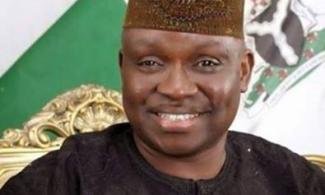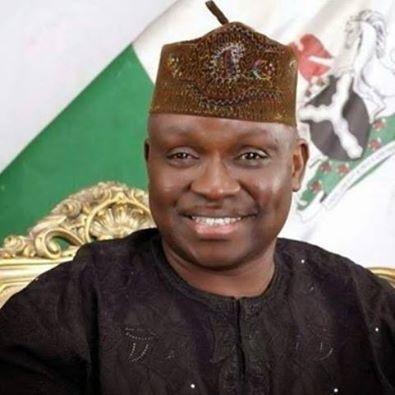
Ekiti State Governor Ayodele Fayose, who has made an impressive career of finding fault with President Muhammadu Buhari, however genuine or foolish, has been unusually quiet about something for which I thought he would have tried to claim credit - the value of the naira.
Ekiti State Governor Ayodele Fayose, who has made an impressive career of finding fault with President Muhammadu Buhari, however genuine or foolish, has been unusually quiet about something for which I thought he would have tried to claim credit - the value of the naira.

In December, when the naira was still trading at N262 = $1, Fayose predicted a difficult year for Nigerians in 2016 and ended his forecast by saying the naira would trade at 320 to the dollar sooner than later. Apart from citing the declining price of oil, he didn't say much else. But like a broken clock, which will be right at least once every day, Fayose is nearly on point, but appears unusually shy for the credit.
In the odyssey of the naira, however, it seems the champion's prize will go not to those who are predicting the worst outcome - and many were already predicting N400 = $1 last week - but to people like Ifeanyi Ubah who are betting their all to save the currency. The brain behind the Transformation Ambassadors of Nigeria, a project that spared no expense for the return of former President Goodluck Jonathan, appears to have finally seen the light. Ubah has now put himself, again at great personal cost, at the disposal of President Muhammadu Buhari's change agenda.
In an unprecedented move, on Sunday Ubah has offered himself for appointment as a special consultant on the reevaluation on the naira, vowing not just to stop the slide, but to reverse it to N200 = $1 within one month.
In a widely circulated text message on Tuesday, he said:
"I wish to thank you (Nigerians) for the support and encouragement you have given me so far. It has been unprecedented. As at this evening, the dollar has dropped further to N310 as against N390 on Sunday evening before my interview with Channels.
"With God and our sincere efforts, even when we have not been fully consulted, the dollar can still be brought down to N200 and below. Let the discourse continue. Shun the dollar till it's N200. Pray for Nigeria and let the dollar go down to N200 and below."
As at Thursday, the naira had firmed up to N300 after surviving what appears to be the worst speculative attack so far in weeks. It had been reported only weeks earlier that commercial banks were harvesting millions of dollars in the difference between the official and parallel market rates, further weakening the naira. Although the CBN did not comment, this abuse seemed unlikely since the bank not only publishes its weekly allocations to commercial banks but also requires them to publish the list of beneficiaries, amount and purpose.
So why did the naira decline so sharply and what has Ubah got to do with the rally of the last few days? It has nothing to do with oil; if anything, the price of oil has moved up slightly in the last one week. It has nothing to do with effective demand. And believe me, it has absolutely nothing to do with Ubah's generous offer to bet N500 billion worth of assets against the fall.
Here was the likely thing that happened. For some time now, there has been speculation that the CBN was about to stop foreign exchange allocation for medical treatment and payment of school fees abroad. Nigerians spend about $2 billion on medical tourism and tuition abroad yearly and the monthly forex demand on the CBN has gone up from N148 billion in 2005 to N917 billion in 2015. Rumours that the CBN was about to crowd out more subsidised forex users from the official market was all that speculators needed to launch a fresh attack.
With the CBN's restriction on 41 items still in place, further restrictions on medical bills and tuition was just the scent of blood the speculative sharks needed. When the rumour broke in the second week of February the value of the naira declined about 12.3 percent from N307 the previous week to N345. Believing they had finally got the government on the ropes, speculators intensified hoarding, raising fears that the rate could go to N400 = $1 by today.
The speculators have grown in numbers as the disparity between the official and black market rates have widened. Displaced bureau de change traders, a growing number of smurfs largely comprising Nigerians abroad and even those at home with foreign bank accounts have joined in the latest round of speculative attack. They are betting that the worst is yet to come and are holding onto their dollar stock, confident that something is about to give.
So, what has Ubah got to do with it? Nothing. The smart ex-TAN and owner of Capital Oil has information and probably needs access. It's not his first try. In May when a strike led to nationwide fuel queues and threatened a bleak handover from Jonathan to Buhari, Ubah dramatically switched sides. He offered his tankers and his tank farm to ease the installation of the same man whose election he had invested everything to prevent.
He's at it again, trading what he's got. In his line of business, which accounts for nearly 45 percent of the forex demand, he would probably need nothing less than $50m monthly and he knows that if prayers could purge the market of greed, the naira would be at par with the dollar by now. If prayers could turn the tide, we won't need a central bank or exchange rate mechanism. The man can get what he wants without being ridiculous.
The naira is firming up not because Ubah said so or because he appeared on two TV programmes during the week. It was simply because contrary to expectations that Buhari would finally yield to the pressure to devalue, he repeated for the umpteenth time in Egypt on Saturday that the naira will not be devalued. He's obviously beginning to sound like a broken record, but the Venezuelan post-devaluation crisis has shown how tight the options are. With poor reserves, a narrow income base and a world that has left us to drink our crude oil, all the government can hope to do now is to manage the demand side. We can't have it both ways.
A source close to the CBN said on Thursday, that, "Buhari's statement over the weekend that his government was not going to devalue most likely pushed speculators to have a rethink and to start off-loading." Ubah has a fairly good idea of how the market works and any forecast by him or offer of help is a matter of enlightened self-interest.
Let's leave God out of this. It was in his name that former Governor Attahiru Bafarawa and his fellow prayer warriors collected N4.6 billion from the $2.1billion set aside to buy arms, which they probably converted to dollars in Aba, preparing the grounds for our present misery.